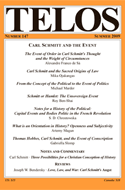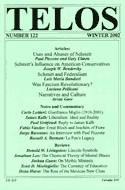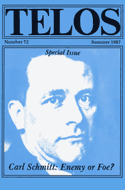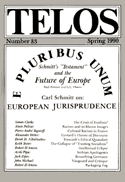By Beau Mullen · Tuesday, January 20, 2015  Central to Carl Schmitt’s geophilosophy is his view that law is intrinsically linked to the physical location. This connection between the terra firma and the law is an essential element of what he refers to as nomos. Schmitt sees this as the most authentic form of law, distinguishable from views that perceive law as a normative or positive regime. In his article “Carl Schmitt and the Sacred Origins of Law,” Mika Ojakangas elucidates Schmitt’s conception of nomos, its relation to Schmitt’s view of mythopolitical legitimization of the state, and the consequences of rejecting the notion of such a link by secularization. Central to Carl Schmitt’s geophilosophy is his view that law is intrinsically linked to the physical location. This connection between the terra firma and the law is an essential element of what he refers to as nomos. Schmitt sees this as the most authentic form of law, distinguishable from views that perceive law as a normative or positive regime. In his article “Carl Schmitt and the Sacred Origins of Law,” Mika Ojakangas elucidates Schmitt’s conception of nomos, its relation to Schmitt’s view of mythopolitical legitimization of the state, and the consequences of rejecting the notion of such a link by secularization.
Continue reading →
By Telos Press · Monday, December 1, 2014 For the month of December, save 20% on all Telos Press books purchased at our website. Now is a great time to pick up copies of some of our newest publications, including Matthias Küntzel’s Germany and Iran: From the Aryan Axis to the Nuclear Threshold and Joel Kotkin’s The New Class Conflict. In our online store you’ll also find key works by Ernst Jünger, such as On Pain and The Forest Passage, as well as Carl Schmitt’s Theory of the Partisan and The Nomos of the Earth. You can browse our full selection of books here.
Continue reading →
By Michael Millerman · Tuesday, August 12, 2014  Like Spinoza, many liberal thinkers have defined the liberty they promote in terms of the necessity of submitting to the law that guarantees it. This is a unique kind of rule of law, a rule of the “‘politically correct,’ universalist, managerial-liberal” (9) law of contemporary liberals. Both internationally and domestically, this law requires the muscular imposition of questionable political, moral, and economic principles, by means of an insidious and often nauseating bureaucratic, technocratic, mediacratic apparatus, onto largely unwilling publics. Crucially, the freedom championed by such liberals and allegedly secured by their law does not include the freedom to refuse their domination root and branch. Like Spinoza, many liberal thinkers have defined the liberty they promote in terms of the necessity of submitting to the law that guarantees it. This is a unique kind of rule of law, a rule of the “‘politically correct,’ universalist, managerial-liberal” (9) law of contemporary liberals. Both internationally and domestically, this law requires the muscular imposition of questionable political, moral, and economic principles, by means of an insidious and often nauseating bureaucratic, technocratic, mediacratic apparatus, onto largely unwilling publics. Crucially, the freedom championed by such liberals and allegedly secured by their law does not include the freedom to refuse their domination root and branch.
Continue reading →
By Linas Jokubaitis · Tuesday, July 15, 2014  In “The Source of the Tragic,” Carl Schmitt developed an original interpretation of The Tragedy of Hamlet, Prince of Denmark rooted in his sociological understanding of the relationship between art and contemporary politics in Shakespeare’s tragedy. According to the German jurist, one can fully understand and appreciate this masterpiece only by taking into consideration the concrete political situation at the end of the reign of the Tudor dynasty and the intense struggles for legitimacy and authority in which Shakespeare created his theatrical works. In “The Source of the Tragic,” Carl Schmitt developed an original interpretation of The Tragedy of Hamlet, Prince of Denmark rooted in his sociological understanding of the relationship between art and contemporary politics in Shakespeare’s tragedy. According to the German jurist, one can fully understand and appreciate this masterpiece only by taking into consideration the concrete political situation at the end of the reign of the Tudor dynasty and the intense struggles for legitimacy and authority in which Shakespeare created his theatrical works.
Continue reading →
By Beau Mullen · Friday, March 7, 2014 As an occasional feature on TELOSscope, we highlight a past Telos article whose critical insights continue to illuminate our thinking and challenge our assumptions. Today, Beau Mullen looks at Gabriella Slomp’s “Thomas Hobbes, Carl Schmitt, and the Event of Conscription” from Telos 147 (Summer 2009).
 As Gabriella Slomp points out in the opening of her article “Thomas Hobbes, Carl Schmitt, and the Event of Conscription,” scholars are split on how to view the relationship between Hobbes and Schmitt. Some see Schmitt as Hobbes’s heir apparent, while others think that Schmitt’s thinking is in fact a rejection of much of Hobbes’s work. Both thinkers emphasize man’s warlike nature, they hold that the state exists to protect men from violent death at the hands of other men, and they maintain that a strong state with unlimited power is best suited to this aim. Both agree that man has an obligation to the state that is reciprocal to the duty of the state to provide security. In this piece, Slomp examines both Schmitt’s and Hobbes’s views of the extent of this obligation and comes to the conclusion that the two are in fact in disagreement. Using their writings on conscription, Slomp reveals that Hobbes has much more concern for the sovereignty of the individual whereas Schmitt never wavers in his affording primacy to the group or state. As Gabriella Slomp points out in the opening of her article “Thomas Hobbes, Carl Schmitt, and the Event of Conscription,” scholars are split on how to view the relationship between Hobbes and Schmitt. Some see Schmitt as Hobbes’s heir apparent, while others think that Schmitt’s thinking is in fact a rejection of much of Hobbes’s work. Both thinkers emphasize man’s warlike nature, they hold that the state exists to protect men from violent death at the hands of other men, and they maintain that a strong state with unlimited power is best suited to this aim. Both agree that man has an obligation to the state that is reciprocal to the duty of the state to provide security. In this piece, Slomp examines both Schmitt’s and Hobbes’s views of the extent of this obligation and comes to the conclusion that the two are in fact in disagreement. Using their writings on conscription, Slomp reveals that Hobbes has much more concern for the sovereignty of the individual whereas Schmitt never wavers in his affording primacy to the group or state.
Continue reading →
By Linas Jokubaitis · Tuesday, February 18, 2014 As an occasional feature on TELOSscope, we highlight a past Telos article whose critical insights continue to illuminate our thinking and challenge our assumptions. Today, Linas Jokubaitis looks at Paul Piccone and Gary Ulmen’s “Schmitt’s ‘Testament’ and the Future of Europe” from Telos 83 (Spring 1990).
 When Schmitt drafted his lecture “The Plight of European Jurisprudence” in 1944, he had reasons to believe that it would be his last lecture. After a failed assassination attempt on Hitler, his friend Johannes Popitz was arrested as an important conspirator in the plot and was later put to death. This is why the article by Paul Piccone and Gary Ulmen on this lecture is called “Schmitt’s ‘Testament’ and the Future of Europe.” The lecture did not prove to be Schmitt’s last. The irony is that what Schmitt wrote as his own testament can today be read as a testament of Europe. The validity of this claim depends only on how one views the current state of Europe. When Schmitt drafted his lecture “The Plight of European Jurisprudence” in 1944, he had reasons to believe that it would be his last lecture. After a failed assassination attempt on Hitler, his friend Johannes Popitz was arrested as an important conspirator in the plot and was later put to death. This is why the article by Paul Piccone and Gary Ulmen on this lecture is called “Schmitt’s ‘Testament’ and the Future of Europe.” The lecture did not prove to be Schmitt’s last. The irony is that what Schmitt wrote as his own testament can today be read as a testament of Europe. The validity of this claim depends only on how one views the current state of Europe.
Continue reading →
|
|
 Central to Carl Schmitt’s geophilosophy is his view that law is intrinsically linked to the physical location. This connection between the terra firma and the law is an essential element of what he refers to as nomos. Schmitt sees this as the most authentic form of law, distinguishable from views that perceive law as a normative or positive regime. In his article “Carl Schmitt and the Sacred Origins of Law,” Mika Ojakangas elucidates Schmitt’s conception of nomos, its relation to Schmitt’s view of mythopolitical legitimization of the state, and the consequences of rejecting the notion of such a link by secularization.
Central to Carl Schmitt’s geophilosophy is his view that law is intrinsically linked to the physical location. This connection between the terra firma and the law is an essential element of what he refers to as nomos. Schmitt sees this as the most authentic form of law, distinguishable from views that perceive law as a normative or positive regime. In his article “Carl Schmitt and the Sacred Origins of Law,” Mika Ojakangas elucidates Schmitt’s conception of nomos, its relation to Schmitt’s view of mythopolitical legitimization of the state, and the consequences of rejecting the notion of such a link by secularization.  Like Spinoza, many liberal thinkers have defined the liberty they promote in terms of the necessity of submitting to the law that guarantees it. This is a unique kind of rule of law, a rule of the “‘politically correct,’ universalist, managerial-liberal” (9) law of contemporary liberals. Both internationally and domestically, this law requires the muscular imposition of questionable political, moral, and economic principles, by means of an insidious and often nauseating bureaucratic, technocratic, mediacratic apparatus, onto largely unwilling publics. Crucially, the freedom championed by such liberals and allegedly secured by their law does not include the freedom to refuse their domination root and branch.
Like Spinoza, many liberal thinkers have defined the liberty they promote in terms of the necessity of submitting to the law that guarantees it. This is a unique kind of rule of law, a rule of the “‘politically correct,’ universalist, managerial-liberal” (9) law of contemporary liberals. Both internationally and domestically, this law requires the muscular imposition of questionable political, moral, and economic principles, by means of an insidious and often nauseating bureaucratic, technocratic, mediacratic apparatus, onto largely unwilling publics. Crucially, the freedom championed by such liberals and allegedly secured by their law does not include the freedom to refuse their domination root and branch.  In “The Source of the Tragic,” Carl Schmitt developed an original interpretation of The Tragedy of Hamlet, Prince of Denmark rooted in his sociological understanding of the relationship between art and contemporary politics in Shakespeare’s tragedy. According to the German jurist, one can fully understand and appreciate this masterpiece only by taking into consideration the concrete political situation at the end of the reign of the Tudor dynasty and the intense struggles for legitimacy and authority in which Shakespeare created his theatrical works.
In “The Source of the Tragic,” Carl Schmitt developed an original interpretation of The Tragedy of Hamlet, Prince of Denmark rooted in his sociological understanding of the relationship between art and contemporary politics in Shakespeare’s tragedy. According to the German jurist, one can fully understand and appreciate this masterpiece only by taking into consideration the concrete political situation at the end of the reign of the Tudor dynasty and the intense struggles for legitimacy and authority in which Shakespeare created his theatrical works.  When Schmitt drafted his lecture “The Plight of European Jurisprudence” in 1944, he had reasons to believe that it would be his last lecture. After a failed assassination attempt on Hitler, his friend Johannes Popitz was arrested as an important conspirator in the plot and was later put to death. This is why the article by Paul Piccone and Gary Ulmen on this lecture is called “Schmitt’s ‘Testament’ and the Future of Europe.” The lecture did not prove to be Schmitt’s last. The irony is that what Schmitt wrote as his own testament can today be read as a testament of Europe. The validity of this claim depends only on how one views the current state of Europe.
When Schmitt drafted his lecture “The Plight of European Jurisprudence” in 1944, he had reasons to believe that it would be his last lecture. After a failed assassination attempt on Hitler, his friend Johannes Popitz was arrested as an important conspirator in the plot and was later put to death. This is why the article by Paul Piccone and Gary Ulmen on this lecture is called “Schmitt’s ‘Testament’ and the Future of Europe.” The lecture did not prove to be Schmitt’s last. The irony is that what Schmitt wrote as his own testament can today be read as a testament of Europe. The validity of this claim depends only on how one views the current state of Europe. 

